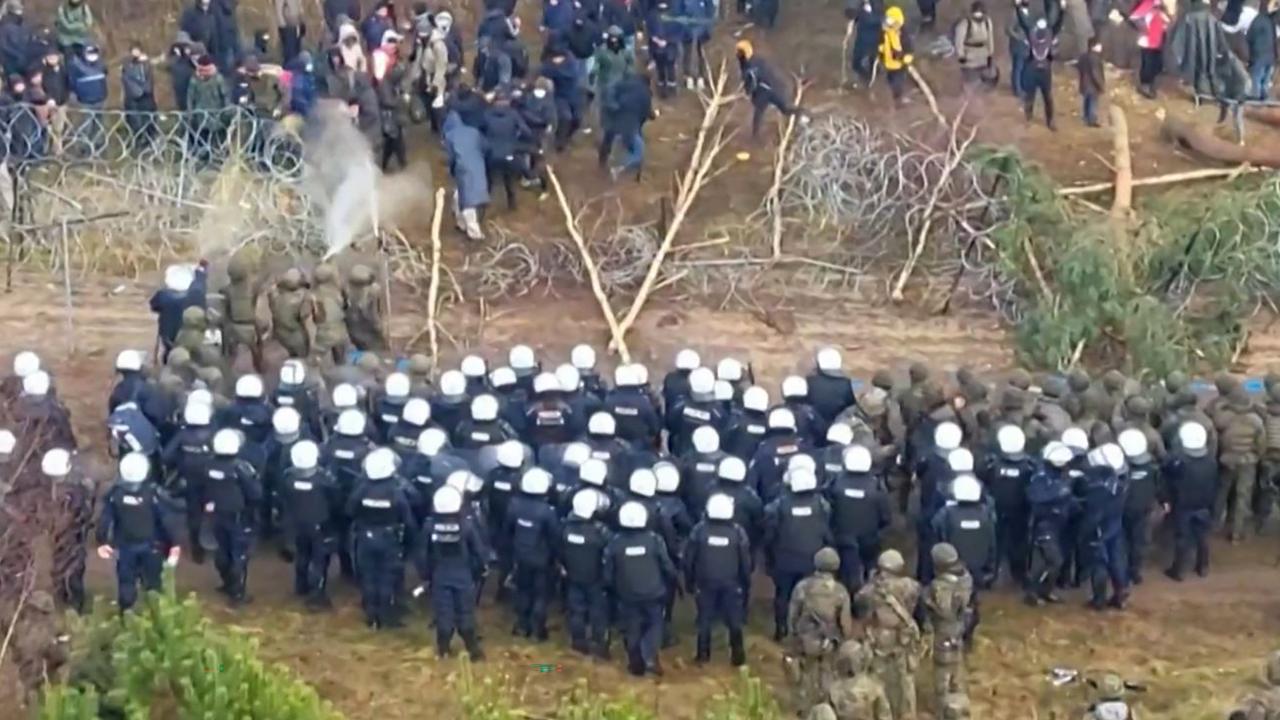Polish president says armed forces on ‘highest alert’
Poland says its armed forces are on “highest alert” to respond to a “hybrid attack” from neighbouring Belarus, accused of weaponing migrants against Europe.
Poland’s president says the country’s armed forces are on “highest alert” and “ready to respond” to the actions of Belarusian strongman Alexander Lukashenko, after hundreds more migrants were prevented from illegally crossing the border.
In a televised address to the mark Poland’s Independence Day on Thursday, Andrzej Duda said Poland had been targeted by a “hybrid attack” under the direction of Mr Lukashenko, who has been accused of “weaponising” migrants against Europe in retaliation for international sanctions over last year’s contested elections.
“I am assuring you, Poland is ready to respond to this action of the Lukashenko regime,” Mr Duda said. “Our border guards, armed forces, police and other services are on the highest readiness alert.”
His comments came as thousands took to the streets of Warsaw for an Independence Day march, led by far-right nationalist groups calling for stronger borders.
Stream more world news live & on demand with Flash, Australia’s biggest news streaming service. New to Flash? Try 14 days free now >
In another dramatic escalation, Mr Lukashenko on Thursday said Minsk “must respond” if the EU takes new measures, raising the possibility of cutting off transit through a pipeline that carries Russian natural gas through Belarus to Poland and further into Europe.
“We are heating Europe, and they are threatening to close the border,” he told state news agency Belta.
“What if we cut off gas to them? Therefore I recommend that the leaders of Poland, Lithuania and the other headless people think before speaking. We should not stop at anything to defend our sovereignty and independence.”
As much as 40 per cent of Europe’s gas comes from Russia, with one fifth passing through Belarus, according to the Financial Times.
Russian President Vladimir Putin told the European Union on Thursday it needs to start talks with Belarus if it hopes to resolve the crisis.
New sanctions loom
Concern is growing for the about 2000 migrants, mainly Kurds from the Middle East, who are living in a tent camp near the border crossing at Kuznica, 250km east of Warsaw, in near-freezing temperatures.
Poland is refusing to allow the migrants to cross, accusing Minsk of luring them to Belarus to send across the border.
The EU has so far refused any direct contacts with Mr Lukashenko.
In his second phone call with German Chancellor Angela Merkel in as many days, Mr Putin “spoke in favour of restoring contacts between EU states and Belarus in order to resolve this problem”, the Kremlin said in a statement.
Ms Merkel had called Mr Putin on Wednesday to ask him to “use his influence” on Mr Lukashenko to end the crisis.
The EU cut off contacts with Mr Lukashenko and imposed sanctions after a heavy crackdown on the opposition following a disputed presidential election last year.
The bloc is expected to decide next week to impose new sanctions for human trafficking because of the migrant crisis.
Opposition leader Svetlana Tikhanovskaya said Mr Lukashenko was bluffing about cutting off gas and urged the EU to stand firm.
“It would be more harmful for him, for Belarus, than for the European Union and I can suppose it’s bluffing,” Tikhanovskaya, who fled Belarus after claiming victory in last year’s vote, told AFP in Berlin.
“We are grateful for the principled position of European countries that they are not going to communicate with (an) illegitimate person.”
The UN Security Council was to meet later Thursday for emergency talks on the crisis.
‘New kind of war’
Poland has deployed 15,000 troops along the border, put up a fence topped with barbed wire and approved construction of a wall on the frontier with Belarus.
In a statement released for Poland’s Independence Day, Prime Minister Mateusz Morawiecki said his country was facing a “new kind of war” whose “ammunition is civilians”.
Migrants have been trying to cross the border for months but the crisis came to a head when hundreds made a concerted effort on Monday and were pushed back by Polish border guards.
They set up a camp on the border, sheltering in tents and burning wood from local forests to keep warm, blocked by Polish guards behind razor-wire.
At least 10 migrants have died on the border in recent months, seven of them on the Polish side, according to Polish newspaper Gazeta Wyborcza.
Teams from the UN refugee agency, the International Organization for Migration and the Red Cross visited the camp on Thursday to check on conditions and deliver aid, including hygiene kits and diapers.
“Priorities now are to prevent loss of life and move people to safer locations in Belarus,” UNHCR chief Filippo Grandi said on Twitter.
Lithuanian Foreign Minister Gabrielius Landsbergis told reporters his country was pushing for an evacuation corridor from the border to the Belarusian city of Grodno, which has an airport that could be used to send people back to their home countries.
Journalists and charity workers have been banned from the immediate border area by Polish authorities under state of emergency rules.
Fear in Polish town
Residents in the Polish town of Sokolka near the border said they were worried by the growing tensions but voiced support for the Polish government’s tough stance.
“I’m afraid of the migrants getting through and what the consequences would be,” said Henryk Lenkiewicz, a 67-year-old pensioner walking by a community noticeboard in the town centre.
Poland has accused Mr Putin of masterminding the crisis, a claim the Kremlin has dismissed as “irresponsible”.
Moscow and Minsk have close economic, political and military ties and Russian air force planes have been flying patrols over Belarus this week, including two Tu-160 strategic bombers on Thursday that were accompanied by Belarusian Su-30S fighter jets.
For all the latest Technology News Click Here

